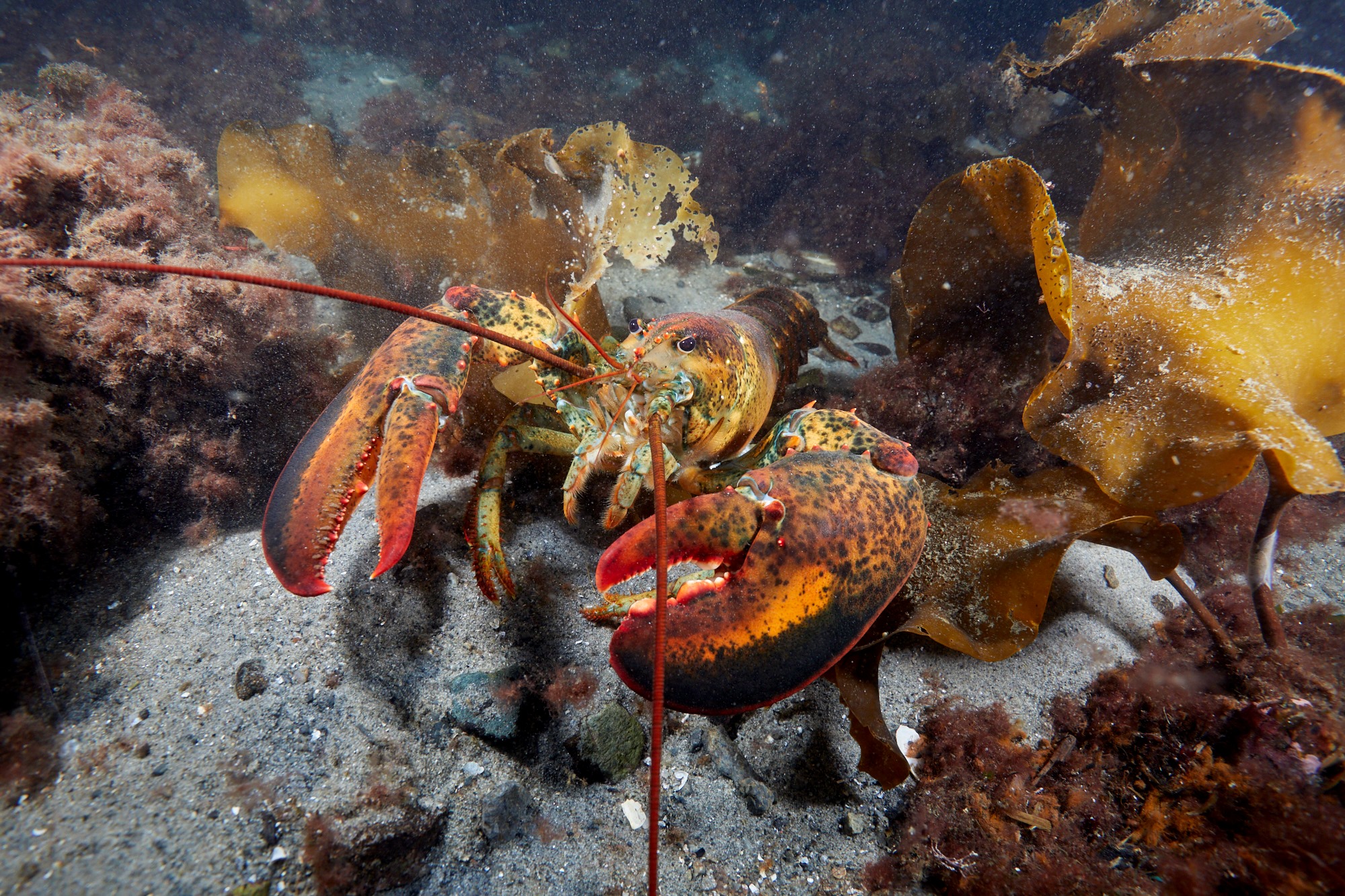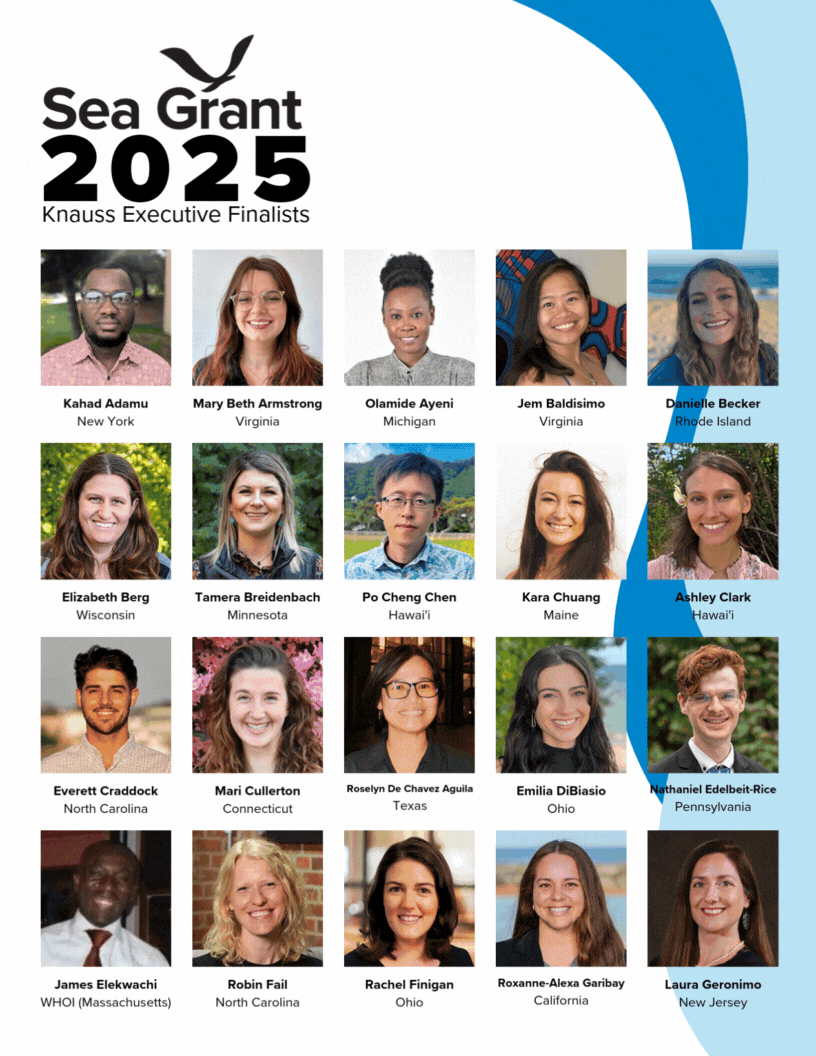Sea Grant and the National Marine Fisheries Service (Fisheries) are pleased to announce the 2020 Fisheries-Sea Grant Joint Fellowship recipients. Nine population and ecosystem dynamics fellowships and one marine resource economics fellowship were awarded through this national program.
The two fellowships offered within this program are aimed at training the next generation of specialized experts in fisheries management. The program addresses the critical need for future fisheries scientists with expertise in stock assessment and related fields.
Since 1999, the Fisheries-Sea Grant Joint Fellowship program has supported students pursuing doctoral degrees in population and ecosystem dynamics as well as marine resource economics.
The field of population and ecosystem dynamics is critical to making high quality fishery stock assessments in order to properly manage U.S. fisheries. Fellows’ research focuses on modeling and managing systems of living marine resources, which includes assessing the status of fish, invertebrate, marine mammal, seabird and other protected species stocks.
For population and ecosystem dynamics fellow Katherine Dale, of California Sea Grant, the fellowship will bring her closer to her goal of bridging the gap between computer science and ecology. “This fellowship gives me the opportunity to connect with amazing NOAA scientists doing important quantitative fisheries research as well as further my own computational skills.”
The marine resource economics fellowship concentrates on economics related to the conservation and management of living marine resources.
This year’s marine resource economics fellow, Russell Dame, worked toward the fellowship since his undergraduate studies at the University of Florida. Of the fellowship, he stated, “This opens up the potential for future interdisciplinary work through data collection and research collaboration that will strengthen the reality of my research projects.”
Fellows are chosen through a competitive process that involves national review by an expert panel. During their fellowship, fellows are guided by at least two mentors, one from the fellow’s university and one from NOAA Fisheries, and they are required to participate in a yearly research symposium.
Last year, a former population dynamics fellow published part of his Ph.D. dissertation in Science, after the fellowship gave him the freedom to devote his time to his research.
Current population and ecosystem dynamics fellow Matthew Damiano, of North Carolina Sea Grant, looks forward to remaining in the field post-fellowship. “I have no doubt that being selected for this fellowship and completing my proposed research will move me further toward this goal.”
Since the fellowship began, it has supported over 100 population and ecosystem dynamics and 35 marine resource economics doctoral fellows. A 2018 review of the program found that 92% of fellows remain in their field and about 30% work for NOAA as a fisheries scientist. Alumni of this fellowship typically hold future positions in NOAA Fisheries, other agencies, academics and fishery management councils.
Meet the 2020 Fisheries-Sea Grant Fellows below.
Population and Ecosystem Dynamics Fellows:
Katherine Dale
California Sea Grant
University of California San Diego
Faculty Advisor: Rita Mehta
Project: Predicting spatio-temporal shifts in larval fish abundance in the eastern Pacific using Bayesian hierarchical modeling
Southwest Fisheries Science Center (SWFSC)
NOAA Mentor: Andrew Thompson
Matthew Damiano
North Carolina Sea Grant
North Carolina State University
Faculty Advisor: Jie Cao
Project: Development and application of a spatially-explicit stock assessment and management strategy evaluation tool for common dolphinfish (Coryphaena hippurus) in the Atlantic Ocean and the Caribbean Sea
Beaufort Lab (SEFSC)
NOAA Mentor: Kyle Shertzer
Nicholas Fisch
Florida Sea Grant
University of Florida
Faculty Advisor: Robert Ahrens, Ed Camp
Project: Evaluating the use of composition data within fisheries assessment and its effect on management
Beaufort Lab (SEFSC)
NOAA Mentor: Kyle Shertzer
Amanda Hart
Woods Hole Sea Grant
University of Massachusetts Dartmouth
Faculty Advisor: Gavin Fay
Project: Tackling technical interactions in ecosystem-based fisheries management through management strategy evaluation
Northeast Fisheries Science Center (NEFSC)
NOAA Mentor: Jonathan Deroba
Cameron Hodgdon
Maine Sea Grant
University of Maine
Faculty Advisor: Yong Chen, James Sulikowski
Project: A framework to assess and forecast spatio-temporal dynamics of fish stocks in a changing environment
Northeast Fisheries Science Center (NEFSC)
NOAA Mentor: Burton Shank
Samuel May
Washington Sea Grant
University of Washington
Faculty Advisor: Kerry Naish
Project: Quantifying the effects of assortative mating on population recruitment and viability
Northwest Fisheries Science Center (NWFSC)
NOAA Mentor: Eric Ward, Robin Waples, Mike Ford
Victoria Quennessen
Oregon Sea Grant
Oregon State University
Faculty Advisor: Will White
Project: Sea turtle population dynamics: consequences and response to climate-shifting sex ratios
Southwest Fisheries Science Center (SWFSC)
NOAA Mentor: Stephan Munch
David Nicholas Weber
Texas Sea Grant
Texas A&M University
Faculty Advisor: David Portnoy
Project: Applying genomic techniques to fisheries management: a focus on exploited groupers (family Serrandiae)
Southeast Fisheries Science Center (SEFSC)
NOAA Mentor: Beverly Barnett
Devynn Wulstein
Hawai’i Sea Grant
University of Hawai’i
Faculty Advisor: Joshua Madin
Project: Structure-from-motion to benthic population models: developing a pipeline for broadscale decision-making on coral reefs
Pacific Islands Fisheries Science Center (PIFSC)
NOAA Mentor: Thomas Oliver
Marine Resource Economics Fellow:
Russell Dame
Oregon Sea Grant
Oregon State University
Faculty Advisor: David Kling
Project: Joint estimation of revealed & stated preference for recreational charter anglers targeting Alaskan Pacific halibut
Alaska Fisheries Science Center (AFSC)
NOAA Mentor: Daniel Lew
To learn more about the field of fisheries management and how experiences like the Fisheries-Sea Grant fellowships address the need for career development opportunities in this specialized field, see this report to Congress and this academic paper.


